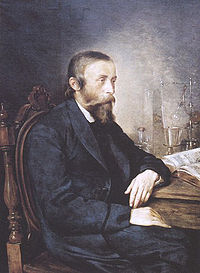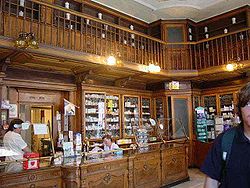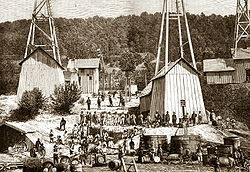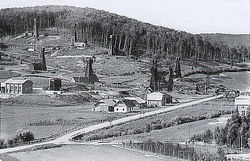
Ignacy Lukasiewicz
Encyclopedia

Poland
Poland , officially the Republic of Poland , is a country in Central Europe bordered by Germany to the west; the Czech Republic and Slovakia to the south; Ukraine, Belarus and Lithuania to the east; and the Baltic Sea and Kaliningrad Oblast, a Russian exclave, to the north...
pharmacist
Pharmacist
Pharmacists are allied health professionals who practice in pharmacy, the field of health sciences focusing on safe and effective medication use...
and petroleum industry
Petroleum industry
The petroleum industry includes the global processes of exploration, extraction, refining, transporting , and marketing petroleum products. The largest volume products of the industry are fuel oil and gasoline...
pioneer who in 1856 built the first oil refinery
Oil refinery
An oil refinery or petroleum refinery is an industrial process plant where crude oil is processed and refined into more useful petroleum products, such as gasoline, diesel fuel, asphalt base, heating oil, kerosene, and liquefied petroleum gas...
in the world. Among his other achievements were the discovery of how to distill kerosene
Kerosene
Kerosene, sometimes spelled kerosine in scientific and industrial usage, also known as paraffin or paraffin oil in the United Kingdom, Hong Kong, Ireland and South Africa, is a combustible hydrocarbon liquid. The name is derived from Greek keros...
from seep oil
Oil
An oil is any substance that is liquid at ambient temperatures and does not mix with water but may mix with other oils and organic solvents. This general definition includes vegetable oils, volatile essential oils, petrochemical oils, and synthetic oils....
, the invention of the modern kerosene lamp
Kerosene lamp
The kerosene lamp is a type of lighting device that uses kerosene as a fuel. This article refers to kerosene lamps that have a wick and a tall glass chimney. Kerosene lanterns that have a wick and a glass globe are related to kerosene lamps and are included here as well...
(1853), the introduction of the first modern street lamp in Europe (1853), and the construction of the first oil well
Oil well
An oil well is a general term for any boring through the earth's surface that is designed to find and acquire petroleum oil hydrocarbons. Usually some natural gas is produced along with the oil. A well that is designed to produce mainly or only gas may be termed a gas well.-History:The earliest...
in Poland (1854).
Łukasiewicz became a wealthy man and one of the most prominent philanthropist
Philanthropist
A philanthropist is someone who engages in philanthropy; that is, someone who donates his or her time, money, and/or reputation to charitable causes...
s in Galicia. Because of his support for the economical development of the region, a popular saying was coined attributing all paved roads to his gulden
Austro-Hungarian gulden
The Gulden or forint was the currency of the Austrian Empire and later the Austro-Hungarian Empire between 1754 and 1892 when it was replaced by the Krone/korona as part of the introduction of the gold standard. In Austria, the Gulden was initially divided into 60 Kreuzer, and in Hungary, the...
s.
Biography



Zaduszniki, Subcarpathian Voivodeship
Zaduszniki is a village in the administrative district of Gmina Padew Narodowa, within Mielec County, Subcarpathian Voivodeship, in south-eastern Poland...
near Mielec
Mielec
Mielec is a city in south-eastern Poland with a population of 60,979 inhabitants, as of June 2009. It is located in the Subcarpathian Voivodeship ; previously it was in Rzeszów Voivodeship...
, in the Austrian empire
Austrian Empire
The Austrian Empire was a modern era successor empire, which was centered on what is today's Austria and which officially lasted from 1804 to 1867. It was followed by the Empire of Austria-Hungary, whose proclamation was a diplomatic move that elevated Hungary's status within the Austrian Empire...
(after the partition
Partitions of Poland
The Partitions of Poland or Partitions of the Polish–Lithuanian Commonwealth took place in the second half of the 18th century and ended the existence of the Polish–Lithuanian Commonwealth, resulting in the elimination of sovereign Poland for 123 years...
of Poland
Poland
Poland , officially the Republic of Poland , is a country in Central Europe bordered by Germany to the west; the Czech Republic and Slovakia to the south; Ukraine, Belarus and Lithuania to the east; and the Baltic Sea and Kaliningrad Oblast, a Russian exclave, to the north...
⌋. His parents were Apolonia née Świetlik and Józef Łukasiewicz, a member of local intelligentsia
Intelligentsia
The intelligentsia is a social class of people engaged in complex, mental and creative labor directed to the development and dissemination of culture, encompassing intellectuals and social groups close to them...
and a veteran of Kościuszko's Uprising. His parents rented a small manor in Zaduszniki, but soon after Ignacy's birth had to move to Rzeszów
Rzeszów
Rzeszów is a city in southeastern Poland with a population of 179,455 in 2010. It is located on both sides of the Wisłok River, in the heartland of the Sandomierska Valley...
due to economical difficulties. There Ignacy started his studies at the local gymnasium
Konarski's High School in Rzeszów
The Konarski Secondary School in Rzeszów is one of the oldest secondary schools in Poland. The school is a coeducational public secondary school...
, but had to abandon it in 1836. To help his parents, Ignacy Łukasiewicz moved to Łańcut where he started to work as a pharmacist's assistant. At the same time he became involved in various political organizations supporting the idea of restoration of Polish sovereignty. In 1840 he returned to Rzeszów, where he continued to practice at the pharmacy of Edward Hübl. In 1845 he met Edward Dembowski
Edward Dembowski
Edward Dembowski was a Polish philosopher, literary critic, journalist, and leftist independence activist.-Life:...
, who admitted Łukasiewicz to the illegal Centralization of the Polish Democratic Society. The aim of that organization was to prepare an all-national uprising
Kraków Uprising
The Kraków Uprising of February 1846 was an attempt, led by Edward Dembowski, to incite a Polish fight for national independence. Even though most of Poland was part of the Russian Empire, the Polish risings were conducted mainly in Prussia and in the Austrian Empire.-History:Most of the...
against the partitioning powers. Because of that, on February 19, 1846 Łukasiewicz was arrested by the Austrian authorities and imprisoned in Lwów. On December 27, 1847 he was released from prison due to lack of evidence, but for the rest of his life he was regarded as politically insecure. He was also ordered to remain in Lwów.
There Łukasiewicz started working for the Pod Złotą Gwiazdą pharmacy owned by Piotr Mikolasch. On his insistence Łukasiewicz was allowed to leave Lwów and join the Kraków University
Jagiellonian University
The Jagiellonian University was established in 1364 by Casimir III the Great in Kazimierz . It is the oldest university in Poland, the second oldest university in Central Europe and one of the oldest universities in the world....
. After several years of studies, financed mostly by Mikolasch, he managed to pass all his university examinations except pharmacognosy
Pharmacognosy
Pharmacognosy is the study of medicines derived from natural sources. The American Society of Pharmacognosy defines pharmacognosy as "the study of the physical, chemical, biochemical and biological properties of drugs, drug substances or potential drugs or drug substances of natural origin as well...
, which prevented him from graduating. Finally, on July 30, 1852 Łukasiewicz graduated from the faculty of pharmacy of the University of Vienna
University of Vienna
The University of Vienna is a public university located in Vienna, Austria. It was founded by Duke Rudolph IV in 1365 and is the oldest university in the German-speaking world...
. He then returned to Lwów. Łukasiewicz had long been interested in the potential of seep oil
Oil
An oil is any substance that is liquid at ambient temperatures and does not mix with water but may mix with other oils and organic solvents. This general definition includes vegetable oils, volatile essential oils, petrochemical oils, and synthetic oils....
as a cheap alternative to the more expensive whale oil
Whale oil
Whale oil is the oil obtained from the blubber of various species of whales, particularly the three species of right whale and the bowhead whale prior to the modern era, as well as several other species of baleen whale...
. In 1853 Jan Zeh, together with his associate Łukasiewicz, was the first in the world to distill clear kerosene
Kerosene
Kerosene, sometimes spelled kerosine in scientific and industrial usage, also known as paraffin or paraffin oil in the United Kingdom, Hong Kong, Ireland and South Africa, is a combustible hydrocarbon liquid. The name is derived from Greek keros...
from seep oil, Canada's Abraham Gesner having first refined kerosene from coal in 1846. On July 31, 1853, Łukasiewicz made one of his kerosene lamp
Kerosene lamp
The kerosene lamp is a type of lighting device that uses kerosene as a fuel. This article refers to kerosene lamps that have a wick and a tall glass chimney. Kerosene lanterns that have a wick and a glass globe are related to kerosene lamps and are included here as well...
s available to a local hospital to illuminate an emergency surgical operation. The date is considered the starting point of modern oil industry.
In early 1854 Łukasiewicz moved to Gorlice
Gorlice
Gorlice is a city and an urban municipality in south eastern Poland with around 29,500 inhabitants . It is situated south east of Kraków and south of Tarnów between Jasło and Nowy Sącz in the Lesser Poland Voivodeship , previously in Nowy Sącz Voivodeship...
, where he continued his work. He set up many companies together with entrepreneurs and landowners. That same year, he opened the world's first oil "mine"
Oil well
An oil well is a general term for any boring through the earth's surface that is designed to find and acquire petroleum oil hydrocarbons. Usually some natural gas is produced along with the oil. A well that is designed to produce mainly or only gas may be termed a gas well.-History:The earliest...
at Bóbrka, near Krosno
Krosno
Krosno is a town and county in Subcarpathian Voivodeship, Poland with 47,455 inhabitants, as of 2 June 2009.Notably Krosno is the site of the first oil well in the world....
(still operational as of 2006). At the same time Łukasiewicz continued his work on kerosene lamps. Later that year he set up the first kerosene street lamp in Gorlice's borough of Zawodzie. In the following years he opened several other oil wells, each of them as a joint-venture with various local merchants and businessmen. In 1856 in Ulaszowice near Jasło he opened an "oil distillery", that is the first industrial oil refinery
Oil refinery
An oil refinery or petroleum refinery is an industrial process plant where crude oil is processed and refined into more useful petroleum products, such as gasoline, diesel fuel, asphalt base, heating oil, kerosene, and liquefied petroleum gas...
in the world. As the demand for kerosene was still low, the plant initially produced mostly artificial asphalt
Asphalt
Asphalt or , also known as bitumen, is a sticky, black and highly viscous liquid or semi-solid that is present in most crude petroleums and in some natural deposits, it is a substance classed as a pitch...
, machine oil and lubricants. The refinery was destroyed in a fire in 1859, but was rebuilt in Polanka
Polanka
Polanka may refer to the following places in Poland:*Polanka, Lower Silesian Voivodeship *Polanka, Lesser Poland Voivodeship *Polanka, Masovian Voivodeship...
near Krosno
Krosno
Krosno is a town and county in Subcarpathian Voivodeship, Poland with 47,455 inhabitants, as of 2 June 2009.Notably Krosno is the site of the first oil well in the world....
the following year.
In 1863 Łukasiewicz, who moved to Jasło in 1858, was already a wealthy man. He openly supported the January Uprising
January Uprising
The January Uprising was an uprising in the former Polish-Lithuanian Commonwealth against the Russian Empire...
and financed help for the refugees. In 1865 he bought a large manor and the village of Chorkówka
Chorkówka
Chorkówka is a village in Krosno County, Subcarpathian Voivodeship, in south-eastern Poland. It is the seat of the gmina called Gmina Chorkówka. It lies approximately south-west of Krosno and south-west of the regional capital Rzeszów.The village has a population of 760.-References:...
. There he established yet another oil refinery. Having gained one of the largest fortunes in Galicia, Łukasiewicz promoted the development of oil industry in the area of Dukla
Dukla
Dukla ; , Duklya] is a town and an eponymous municipality in southeastern Poland, in the Subcarpathian Voivodship. The town is populated by 2,127 people . while the total population of the commune containing the town and the villages surrounding it is 16,640...
and Gorlice
Gorlice
Gorlice is a city and an urban municipality in south eastern Poland with around 29,500 inhabitants . It is situated south east of Kraków and south of Tarnów between Jasło and Nowy Sącz in the Lesser Poland Voivodeship , previously in Nowy Sącz Voivodeship...
. He gave his name to several oil-mining enterprises in the area, including the oil wells of Ropianka, Wilsznia, Smereczne, Ropa and Wójtowa. He also became the benefactor of the region and founded a spa resort in Bóbrka, a chapel in Chorkówka and a large church in Zręcin. As one of the best-known businessmen of his times, he was elected to the Galician Sejm. In 1877 Łukasiewicz also organized the first Oil Industry Congress and founded the National Oil Society. Ignacy Łukasiewicz died January 7, 1882, of pneumonia
Pneumonia
Pneumonia is an inflammatory condition of the lung—especially affecting the microscopic air sacs —associated with fever, chest symptoms, and a lack of air space on a chest X-ray. Pneumonia is typically caused by an infection but there are a number of other causes...
. He was buried at the small cemetery of Zręcin
Zrecin
Zręcin is a village in the administrative district of Gmina Chorkówka, within Krosno County, Subcarpathian Voivodeship, in south-eastern Poland. It lies approximately north of Chorkówka, west of Krosno, and south-west of the regional capital Rzeszów....
, next to the Gothic Revival church he had financed.

